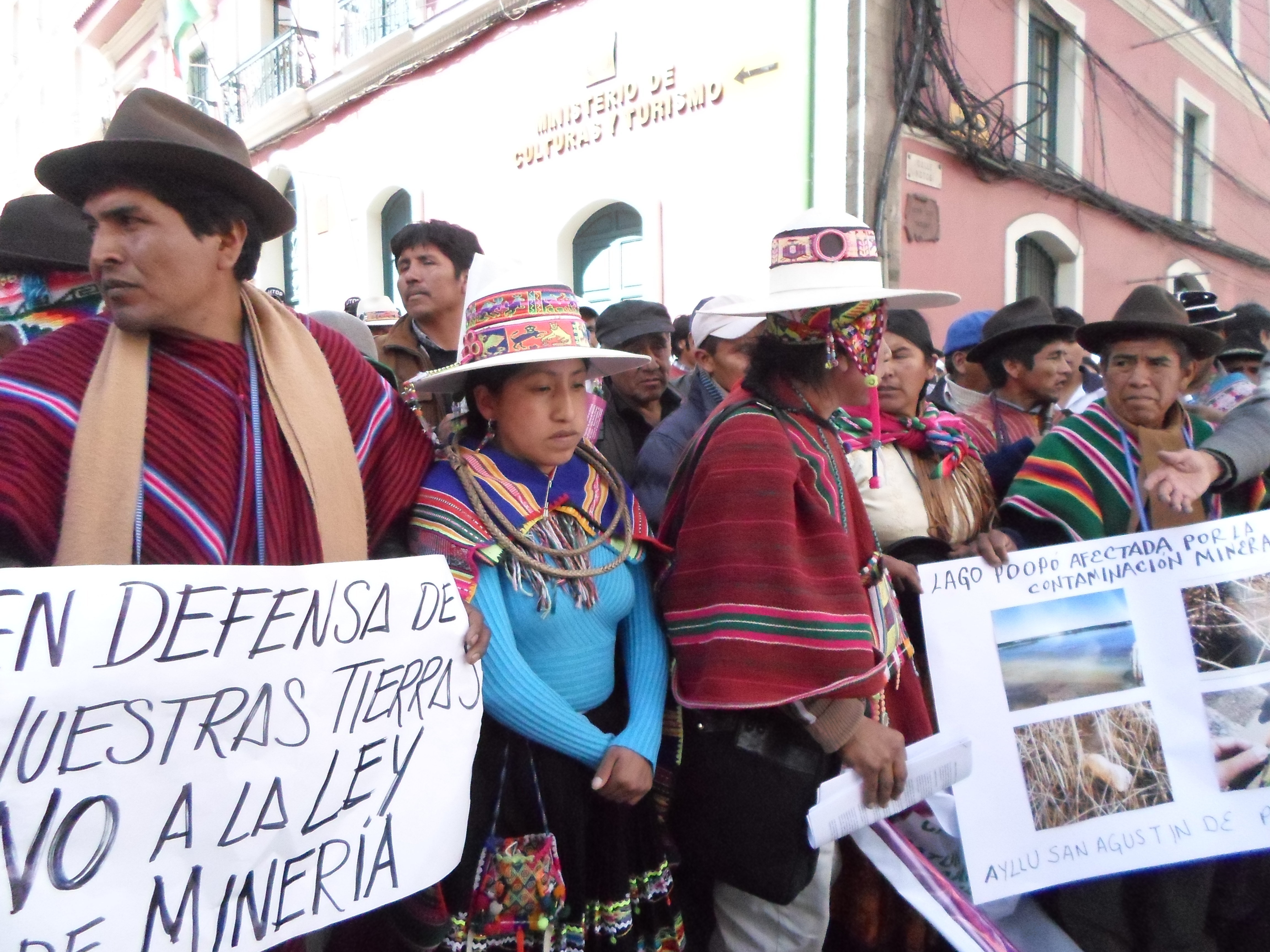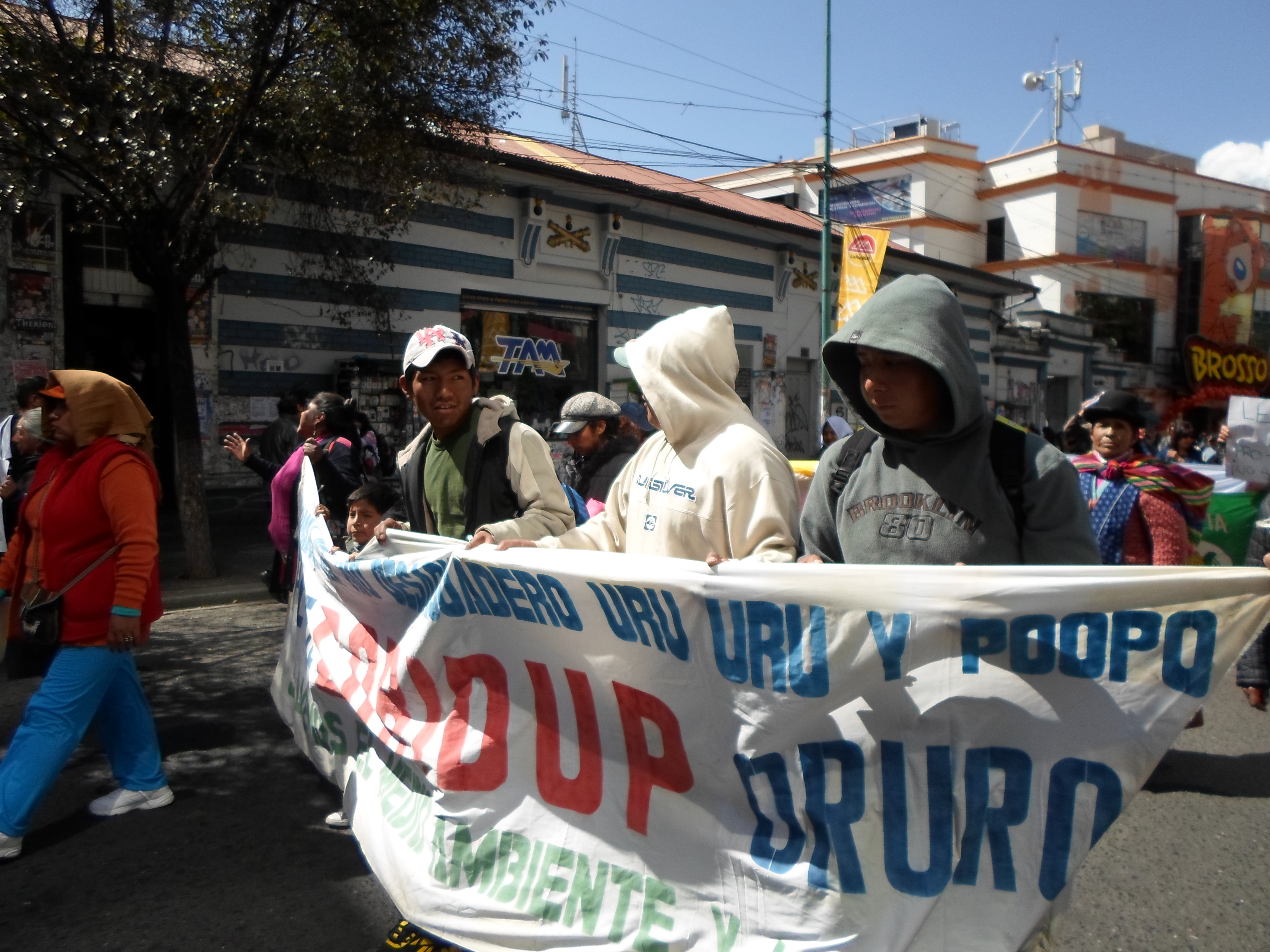New Bolivian Mining and Metallurgy Law Highlights Conflict Between Constitutional Rights and Economic Development
By Elizabeth López, Volunteer, UMAVIDA, Joining Hands Bolivia

Members of indigenous and social organizations carry out a sit-in around the Plaza Murillo, outside of the government headquarters, demanding the repeal of the new Mining and Metallurgy Law. May, 2014. Photo courtesy of Elizabeth López.
A new Mining and Metallurgy Law was passed in Bolivia on May 28, 2014. The law was written without the consultation of rural communities, indigenous people, urban populations, farmers and others most impacted by the consequences of mining extraction.
The passing of this legislation has brought the debate on the value of rights to the forefront. Are the rights to work and develop of more value than the rights to water, health and life?
Social organizations and civil society representatives question the passing of this new law as it directly threatens the rights established in the State Constitution such as the right to water and health, the right to a healthy and protected environment, and the right to individual and collective property. In particular, indigenous’ rights to self-determination, land, and prior, free and informed consent have been violated.
This law makes it clear that the social and environmental costs of mining are considered acceptable costs in order to continue to grow the economic development of the country. However, these costs are not shared equally amongst the Bolivian people. Regions with long histories of mining, such as Oruro and Potosí, are some of the poorest in the country. Not only are they economically poor, but their close proximity to mining waste directly impacts the health and quality of life of their inhabitants. Health problems that occur due to co-existence with and exposure to heavy metals and toxics are not registered by health centers and, therefore, usually not treated accordingly.
As these populations live with disease and illness in their bodies, disease also courses through the veins of the country – all of the rivers suffer from mining contamination. However, serious problems of contamination are concentrated in the lower basin of the Desaguadero River, an endorheic basin (a basin whose waters do not drain into the sea, but flow into lakes, lagoons, or salt lakes), located on the high plateau in the state of Oruro.

Members of CORIDUP, with which UMAVIDA works in Oruro, Bolivia, participate in the protest march against the passing of the new mining law, 2014.
This is where UMAVIDA, the Joining Hands network in Bolivia, carries out its advocacy work through their partner organizations, CEPA (Center for Ecology and Andean People) and CORIDUP (Coordinator in Defense of the Desaguadero River and the Uru Uru and Poopó Lakes).
Dozens of studies on the impact of mining on water – waters used for irrigation and for human and animal consumption – were carried out in the 1980s. All of these studies found the existence of heavy metals above permissible levels in these waters.
Due to the gravity of the environmental situation in the basin, and through a series of demands and denouncements by the communities, with the support of UMAVIDA, the basin was declared an Environmental Emergency Zone in 2009 by Supreme Decree N0335. With this declaration, it was assumed that all mining work would be suspended while a plan for environmental remediation was put into place and an inventory of the damage was taken.
However, to date, the Supreme Decree has not been enforced, nor have actions been encouraged, promoted or initiated for remediation and to stop the continued contamination.
The debate goes beyond whether mining should exist or not, and beyond the right for all Bolivians to work. This is ultimately a debate about the right to life. Indigenous organizations, rural famers and others are working to defend the right to life, understanding that life includes not only human life but also the life of Mother Earth. Mining as currently practiced has proven to endanger life and this new mining legislation endorses this attack.
![]() You may freely reuse and distribute this article in its entirety for non-commercial purposes in any medium. Please include author attribution, photography credits, and a link to the original article. This work is licensed under a Creative Commons Attribution-NonCommercial-NoDeratives 4.0 International License.
You may freely reuse and distribute this article in its entirety for non-commercial purposes in any medium. Please include author attribution, photography credits, and a link to the original article. This work is licensed under a Creative Commons Attribution-NonCommercial-NoDeratives 4.0 International License.